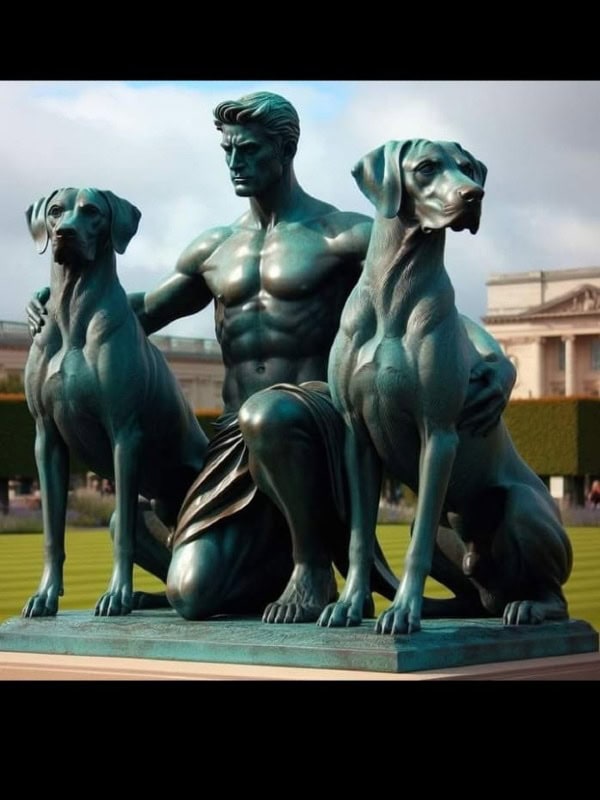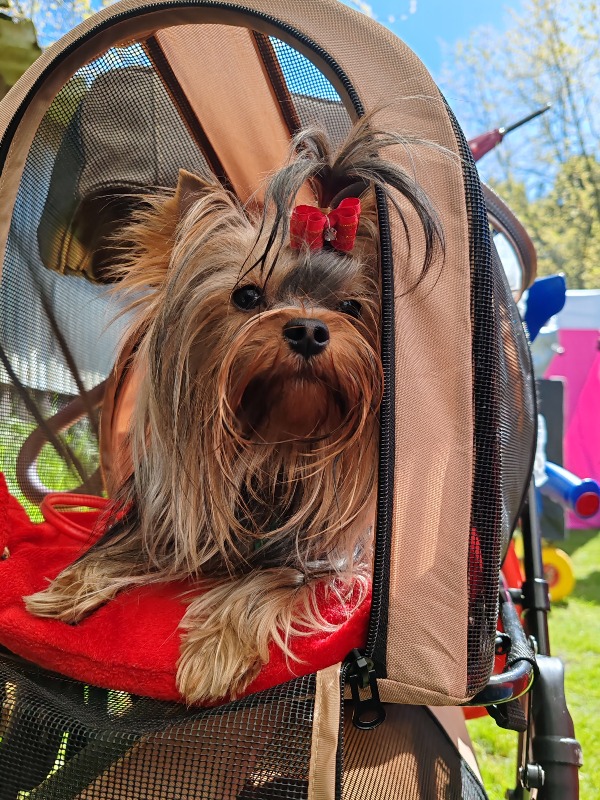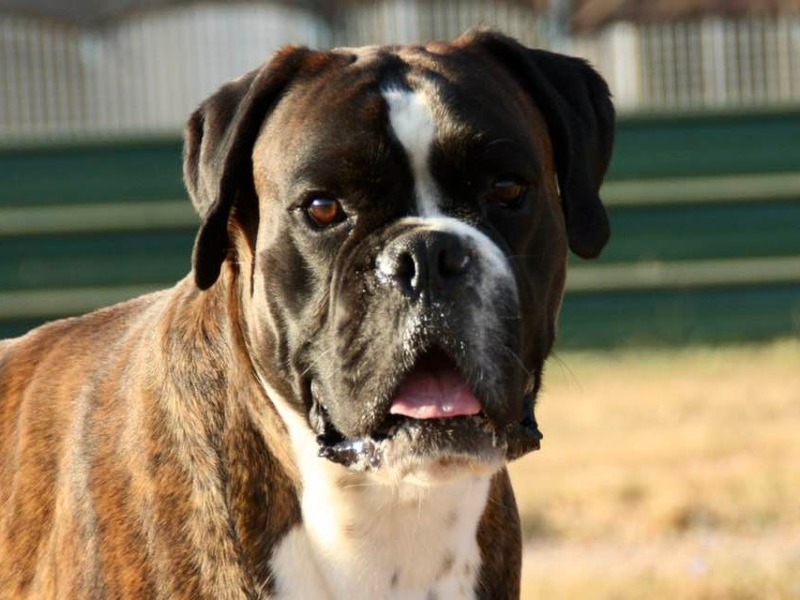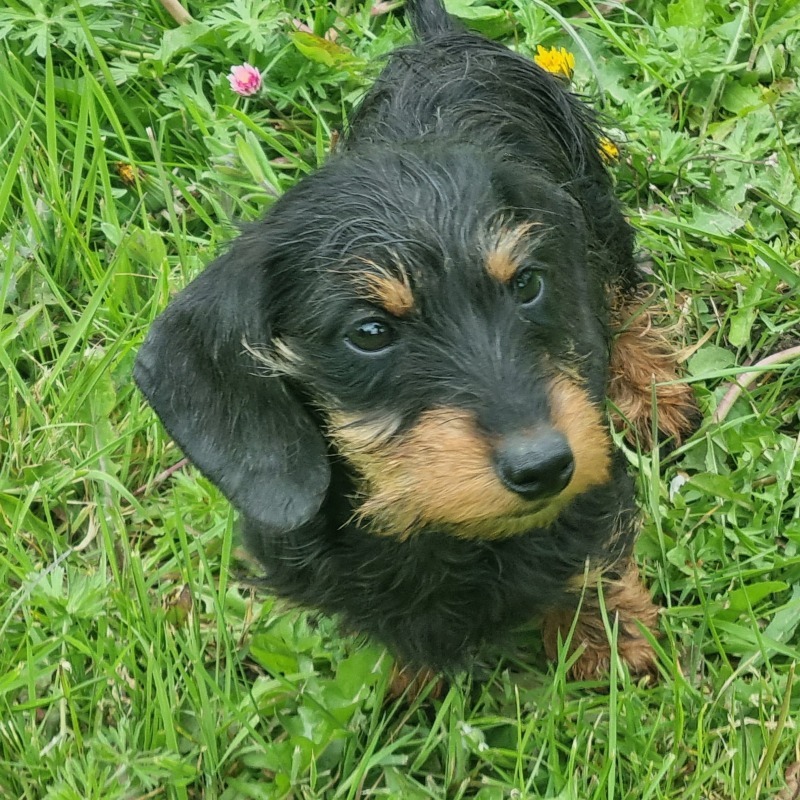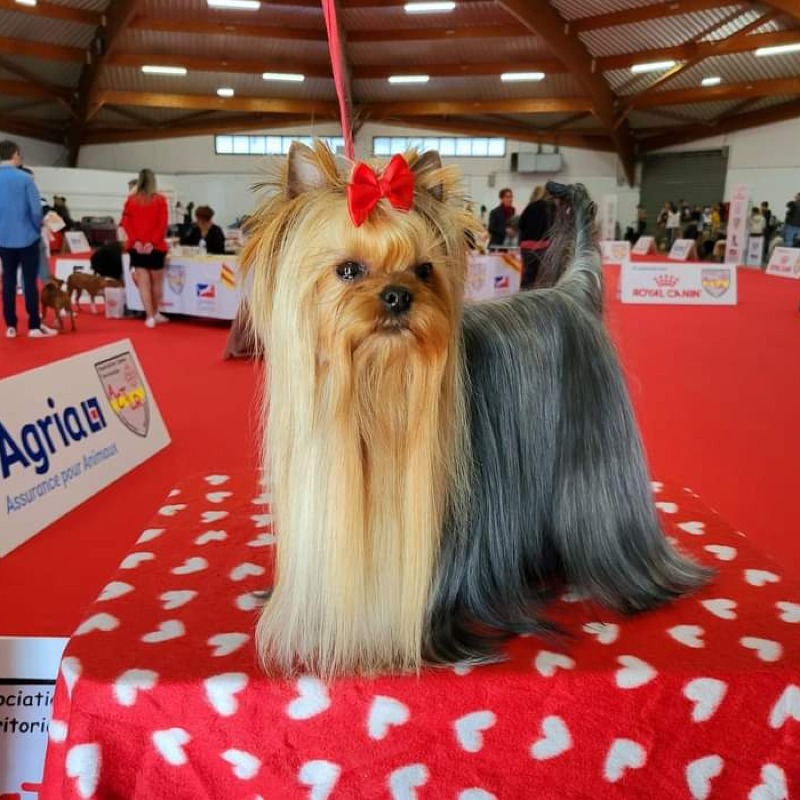Yorkshire terrier
Autres noms : Yorkie, Toy terrier, Yorkshire miniature, York
Discover the Yorkshire Terrier, a dog with a dynamic character and a charming personality. Small yet full of energy, this faithful companion combines elegance and playfulness, making him the ideal friend for families and city dwellers. Learn more about his needs, training, and health.
Awareness of acquiring an animal
Adopting or breeding a dog is a responsibility that must be carefully considered. Dogs are loyal companions that require time, attention, and constant care. Whether for leisure, passion, or professional breeding, it is crucial to understand the specific needs of each breed. Provide them with a loving and stimulating environment, and avoid any impulsive acquisition that could harm their well-being. Be a vigilant and committed owner for a happy and healthy companion.
To learn more about animal welfare, we invite you to consult our FAQ by clicking the button below:
Origins and history
The Yorkshire Terrier is a dog breed that originated in the United Kingdom, specifically in the Yorkshire region, in the 19th century. At that time, breeders in the area sought to create a dog that would be effective in capturing rats in textile factories and mines. The direct ancestors of this breed include terriers such as the Waterside Terrier and the Clydesdale Terrier, which were instrumental in giving birth to a small dog with long hair.
Over the years, the breed evolved from a working dog to a beloved companion animal favored by high society. Its small size, bold temperament, and silky coat quickly won hearts. In salons and dog shows, the Yorkshire Terrier gained popularity, becoming a symbol of refinement and social status.
The Yorkshire Terrier is known for its dynamic and affectionate character, combining bravery and gentleness. Today, it is one of the most cherished dogs worldwide, renowned for its ability to adapt to various environments while remaining attentive and devoted to its owner. In short, this small dog with a big heart embodies a rich history and undeniable charm.
Physical characteristics
The Yorkshire Terrier is a small companion dog, known for its diminutive size and elegant appearance. Typically, it measures between 20 and 23 centimeters in height at the withers and weighs between 1.5 and 3.2 kilograms. Its small stature makes it an ideal companion for urban life.
Its coat is one of the most distinctive features of this breed. It is long, silky, and usually steel blue in color with tan markings on the chest and legs. The silky texture of the fur gives it a very refined look, and its maintenance requires regular attention to prevent tangles.
The eyes of the Yorkshire Terrier are bright, shiny, and medium-sized, giving this dog a sparkling and curious expression. Its ears are small, "V"-shaped, and stand upright, which adds to its alert and lively appearance. Finally, its tail is generally well-proportioned and can be carried high, often slightly curved. These physical characteristics make the Yorkshire Terrier a highly appreciated pet for its charm and elegance.
Character
The Yorkshire Terrier is a small dog with a dynamic and fearless temperament. Despite its small size, it has a bold personality that often makes it reckless. This character trait makes the Yorkshire a lively companion, ready to explore its environment with curiosity and enthusiasm. They are also very alert, which makes them good watchdogs, always on the lookout to protect their home.
Emotionally, these dogs are generally very attached to their owner. They often develop a strong bond and seek human companionship. This social aspect makes them eager for cuddles and attention, but they can also show a certain jealousy towards other animals or people who share their space. Their affectionate nature makes them excellent companions for families and individuals alike.
Finally, the Yorkshire Terrier can be quite stubborn, requiring patient and consistent training. Their intelligence is an asset, but it is important to use positive training methods to avoid undesirable behaviors. In summary, the Yorkshire Terrier combines vitality, affection, and a somewhat rebellious streak, making it both a joyful and demanding pet.
Life expectancy
The lifespan of a Yorkshire Terrier generally ranges from 12 to 15 years. This longevity makes it a breed of small dogs favored by families and people living alone. Several factors influence this lifespan, including genetics, diet, exercise, and veterinary care.
In terms of health, Yorkshire Terriers can be prone to certain hereditary conditions. Dental issues and eye disorders are among the most common. It is essential to pay attention to their dental hygiene and to consult a veterinarian regularly for health check-ups.
A balanced diet suited to their size is crucial for maintaining their health. Exercise is also important, even though these dogs tend to be quite active in their home environment. Regular walks enhance their physical and mental well-being.
Finally, a stable and loving environment contributes significantly to their longevity. A strong bond with their owners and a peaceful living setting promote a better quality of life.
Exercise and activity needs
The Yorkshire Terrier, although small, has specific needs when it comes to exercise and activity. It is important to recognize that this dog, despite its size, has boundless energy. A daily exercise routine is essential for maintaining its physical and mental health. Generally, a daily walk of 30 minutes combined with interactive play is sufficient to meet its needs.
Activities like playing fetch or agility courses can also be very beneficial. These games not only stimulate its body but also engage its mind, thereby reducing the risk of undesirable behaviors caused by boredom.
However, it is crucial to ensure that the dog does not get too tired, especially in hot weather. Special attention must be paid to its overall well-being. Short, frequent training sessions can also strengthen the bond between the owner and the dog while teaching useful commands. In summary, a balance between physical exercise, mental stimulation, and rest is the key to a happy and healthy life.
Recommended diet
The diet of a Yorkshire Terrier should be tailored to its specific needs, taking into account its size, high metabolism, and predisposition to certain health issues. It is essential to prioritize a high-quality diet rich in animal proteins to support its vitality and muscle development. Lean meats, such as chicken or fish, are excellent sources of protein.
Fat needs are also important, as they provide energy and promote healthy skin and a shiny coat. Omega-3 and omega-6 fatty acids, found in certain types of oils, can help prevent skin problems that are common in this breed. Additionally, carbohydrates should be provided in moderate amounts, opting for easily digestible sources like brown rice or vegetables.
It is crucial to pay attention to the size of the kibble, as small bites will facilitate chewing and digestion. Furthermore, portions should be adjusted based on age, weight, and activity level to avoid overweight, a common issue in this breed. To ensure optimal health, it is recommended to consult a veterinarian to develop a personalized dietary plan.
Training and obedience
Training and educating a Yorkshire Terrier requires a specific approach, taking into account its lively personality and small size. It is essential to start at a young age with short and fun training sessions in order to maintain its attention and promote positive learning. Reward-based methods, such as treats and praise, prove to be particularly effective for this breed.
Socialization plays a crucial role in the development of a well-balanced Yorkshire Terrier. Exposing the puppy to various environments, people, and other animals from an early age helps it become a confident and less fearful adult. Socialization classes can be beneficial, encouraging safe and positive interactions.
An essential aspect is consistency in training. Establish clear rules and ensure that all family members adhere to them. This will prevent any confusion for the dog. Yorkshire Terriers can be stubborn, so patience and perseverance are key. Finally, make sure to incorporate appropriate physical and mental activities, as these small dogs need stimulation to avoid boredom, which can lead to undesirable behaviors.
Behavior with children
The Yorkshire Terrier is known for its lively personality and boundless energy. Generally, these dogs are affectionate and loyal, making them good companions for children. However, their behavior with young ones is influenced by several factors, including socialization, training, and the child's size.
Early socialization is crucial for a Yorkshire. By exposing this dog to different people, environments, and situations from a young age, a balanced behavior is encouraged. This helps the Yorkshire become more tolerant and less fearful of sudden movements or loud noises, which can often scare some dogs. A well-socialized Yorkshire is likely to interact positively with children.
Training also plays a fundamental role. A well-trained Yorkshire will respond better to commands and know how to handle interactions with children. With positive education focused on reinforcement, the dog will learn to respect children's boundaries, which reduces the risk of undesirable behaviors. A gentle approach will be beneficial in establishing a harmonious relationship.
Finally, the size of the children can influence the Yorkshire's behavior. Young children, because of their energy, may sometimes be perceived as overwhelming. The Yorkshire, although a brave dog, may feel cornered and react defensively. It is therefore important to teach children to approach the dog calmly and respectfully. In summary, with good socialization and proper training, the Yorkshire Terrier can prove to be an excellent companion for children.
Compatibility with Other Animals
The Yorkshire Terrier is a small dog with a dynamic and affectionate personality, making it a beloved companion. Its compatibility with other pets often depends on early socialization and life experiences. Generally, this breed gets along well with other dogs, especially if it has been properly socialized from a young age. Regular interactions with other dogs can promote friendly behavior and reduce signs of aggression.
However, when it comes to living with larger animals, such as medium or large dogs, caution is advised. Due to its small size, the Yorkshire may appear as prey to some animals. Therefore, it is important to supervise interactions to prevent accidents. A gradual and positive introduction is essential to establish peaceful relationships.
Regarding cats, Yorkshire Terriers can coexist harmoniously with them, especially if they are raised together. Meetings should be supervised to prevent the dog from becoming too intrusive, which could stress the cat. In summary, with proper socialization and attentive supervision, the Yorkshire Terrier can integrate well into a household with other animals.
Grooming needs
The Yorkshire Terrier is a dog breed that requires regular grooming due to its long and silky coat. In fact, its fur needs to be brushed daily to prevent knots and tangles. Without proper care, the coat can quickly become difficult to manage, causing discomfort for the animal. The use of a metal comb or a pin brush is recommended for gently detangling the fur.
In terms of grooming, it is advisable to have regular visits to a professional, typically every month. This will help keep the coat healthy while giving it a well-groomed appearance. Furthermore, trimming the hair around the eyes and paws is often necessary to ensure good visibility and to prevent slips.
Nail maintenance is also crucial. They should be trimmed every four to six weeks to prevent pain and injury. Similarly, it is essential to regularly check dental hygiene and establish a cleaning routine to avoid oral health problems. Finally, regular checks of the ears and eyes are equally important for maintaining the overall health of the animal.
Health
The Yorkshire Terrier is a popular small dog breed, appreciated for its affectionate temperament and lively personality. However, it is crucial to consider several aspects of its health. Due to its small size, this breed is predisposed to certain health issues, particularly dental diseases. Regular dental care is essential to prevent plaque buildup and infections.
Another common concern lies in respiratory problems. Its trachea can be fragile, making breathing accidents fairly common. It is important to ensure that the dog is not too excited or stressed to minimize these risks. Additionally, the breed is prone to genetic disorders such as patellar luxation, which can cause pain and mobility issues.
Finally, special attention must be paid to nutrition. A balanced diet and proper weight management are essential to prevent obesity, which can exacerbate other health problems. Regular veterinary visits help ensure that the dog stays healthy throughout its life. By being aware of these issues, owners can provide their companion with a healthy and happy life.
Environment and habitat
The Yorkshire Terrier is a breed of small dogs that is distinguished by its silky coat and dynamic personality. Originating from England, this breed was initially bred to hunt rodents in factories and mines. The temperament of this animal is cheerful and curious, making it an ideal companion for many households.
In terms of environment, the Yorkshire Terrier easily adapts to apartment living due to its small size. However, it requires regular walks to meet its exercise needs. Although this dog can be sensitive to extreme weather conditions, it is particularly resilient to indoor life, where it enjoys warmth and comfort.
For its habitat, it is preferable to create a safe and welcoming space with toys, cushions, and possibly a small bed. Daily care, such as brushing its coat, is essential to prevent tangles and maintain good hygiene. The Yorkshire Terrier thrives when surrounded by love and attention, which strengthens its bond with family members.
Name ideas
Choosing a name for your Yorkshire Terrier is a crucial step that will reflect your companion's personality and character. A good name should be short, easy to pronounce, and memorable. Avoid names that are too long or complicated, as this could make it more difficult for your dog to learn. Also, consider the meaning and origin of the words you choose: a name with a positive connotation can strengthen the bond between you and your pet.
To select a name wisely, observe the behavior and specific traits of your Yorkshire Terrier. Some may prefer names inspired by pop culture, while others may lean towards affectionate terms that evoke tenderness or elegance associated with this breed. Don’t be afraid to be creative, but make sure to choose a name that you will be happy to shout in the park!
Here is a list of suggestions for naming your Yorkshire Terrier: Bijou, Coco, Pompom, Pixie, Choupette, Biscuit, Nala, Rouquin, Salsa, Gigi, Zouzou, Sparky, Lotus, Moka, Wally. These names, both fun and charming, are sure to capture the lively and affectionate spirit of the Yorkshire Terrier.
Average purchase price
The purchase price of a purebred dog can vary significantly based on several factors. For the Yorkshire Terrier, average prices generally range from 700 to 3000 euros. This amount can fluctuate depending on the breeder's reputation, the lineage, and the specific characteristics of the puppy.
Reputable breeders, who practice ethical and responsible breeding, tend to set higher prices. A puppy from a champion lineage or with an exceptional pedigree can cost up to 3000 euros. On the other hand, a lower price, ranging between 700 and 1500 euros, may often indicate a less reputable breeder or a dog whose characteristics do not conform to breed standards.
It is also essential to consider additional costs associated with acquiring a pet. This includes health care, food, accessories, and grooming. Investing in a quality puppy from a serious breeder can help limit future health issues. Ultimately, the purchase price is just one part of the overall financial commitment to expect when welcoming a new pet.
Expenses
Monthly expenses for a Yorkshire Terrier can vary depending on several factors, but it is important to plan a budget to ensure the well-being of the animal. On average, it is reasonable to expect expenses between 70 and 150 euros per month.
First of all, food is an essential expense. A Yorkshire Terrier requires quality nutrition, and the cost of food can represent about 30 to 50 euros per month, depending on the chosen brands and the specific dietary needs of the animal.
Next, it is advisable to include the cost of regular veterinary care. This may include vaccinations, parasite treatments, and check-ups. For these expenses, it is wise to budget around 20 to 40 euros per month, although this can fluctuate based on individual needs.
Additionally, one must consider expenses related to grooming and maintenance, which can amount to approximately 20 to 40 euros per month. Finally, do not forget to account for accessories such as toys, walking gear, and hygiene products, which can add around fifteen euros to the monthly budget. In conclusion, establishing a monthly budget for a Yorkshire Terrier is essential to ensure its health and happiness.
Destination and usage
The Yorkshire Terrier is a popular companion dog known for its small size and endearing personality. This breed is distinguished by its silky coat and lively temperament, making it an ideal companion for city dwellers and those living in apartments. Its affectionate nature makes it a beloved companion for families, elderly individuals, and people living alone. Yorkshire Terriers are often chosen for their ability to adapt to various living environments, particularly apartments where space is limited.
These dogs are also very sociable and tend to form strong bonds with their owners. Their playful and curious personalities make them entertaining and interactive companions. Walks, indoor and outdoor games, and cuddle sessions are common activities that foster a lovely bond between the dog and its owner.
Furthermore, their small size makes them easy to transport, allowing them to accompany their owners on trips or vacations. Yorkshire Terrier owners also appreciate their presence in dog-friendly restaurants and cafés, reinforcing their role as true life companions. In summary, these dogs offer constant affection and shared happiness, making them highly sought-after pets.
Legislation and regulation
The legislation and regulations concerning Yorkshire Terriers vary significantly from country to country, reflecting cultural attitudes and specific concerns regarding certain breeds. In several European countries, for example, there are no particular restrictions for this breed, which is often celebrated for its friendly nature and small size. This makes it a popular choice among urban dwellers.
On the other hand, in some countries, stricter laws are in place regarding dog ownership in general, particularly concerning living conditions, vaccination, and behavior. These regulations aim to ensure the safety of both animals and people. Yorkshire Terrier owners often need to ensure that their dogs are properly trained and socialized to avoid any problematic behavior.
Furthermore, the issue of animal protection imposes requirements that can influence the trade and breeding of the breed. Some legislations seek to prohibit breeding under certain conditions to prevent common hereditary health problems found in small breeds.
Ultimately, owners must familiarize themselves with local laws regarding Yorkshire Terriers to ensure their well-being and comply with existing regulations.
Official recognition
The Yorkshire Terrier is one of the most popular and recognized dog breeds worldwide. In many countries, this breed enjoys official recognition from major canine federations. For example, in the United States, the American Kennel Club (AKC) has recognized this breed since the 1800s, and it is often ranked among the most sought-after companion breeds. Its popularity is attributed to its small size and dynamic temperament.
In Europe, the Fédération Cynologique Internationale (FCI) also recognizes the Yorkshire Terrier and has established an official standard that defines its physical and behavioral characteristics. This ensures a degree of uniformity and quality among breeders. In several European countries, breed clubs have been formed to promote welfare and good breeding practices.
On the other hand, in some regions of the world, official recognition may be less developed. In developing countries, for example, the breed may be raised without oversight or clear standards, which can lead to health and welfare issues. Therefore, although official recognition is generally well established, disparities exist on a global level.
Pedigrees
To obtain a pedigree for Yorkshire Terrier dogs, several registries and national clubs can be consulted. In France, the Livre des Origines Français (LOF) is the official organization responsible for managing pedigrees for purebred dogs. Registration with the LOF guarantees the purity of the lineage and documents the genealogical history of each animal.
In other countries, similar organizations exist. In the United States, the American Kennel Club (AKC) plays a central role in registering Yorkshire Terriers. The AKC also provides information on breed standards and organizes dog events, allowing owners to have their dogs evaluated for compliance with these standards.
Many specialized clubs, such as the Yorkshire Terrier Club in France, offer support to owners and breeders by facilitating the exchange of information on best breeding practices, dog health, and breed standards. These clubs can also organize shows and competitions, thus contributing to the promotion and enhancement of the breed.
It is important to verify that the breeder is a member of a recognized club to ensure the quality and traceability of the animals.
Prohibitions
Restrictions regarding dog breeds, including Yorkshire Terriers, vary significantly from country to country. In many places, this breed is often appreciated for its friendly temperament and small size, making it a sought-after companion in urban environments. However, some regulations aim to protect animals and the public, leading to restrictions on the ownership or sale of dogs.
In several countries, laws specifically address noise nuisances, which can affect Yorkshire Terrier owners, as they are often known for barking frequently. Municipalities may impose limits on the number of animals that can be owned in restricted housing or apartments. Additionally, certain regions impose requirements for sterilization or vaccination to control the dog population and reduce health risks.
Finally, prohibitions may exist in cases of behavior deemed aggressive. Although Yorkshire Terriers are not traditionally considered dangerous, individual incidents can lead to local regulations, thus reinforcing the need for proper training and early socialization.
Breeders of Yorkshire terrier
Want to see more breeders of Yorkshire terrier?
Check out the page of our directory listing all breeders of Yorkshire terrierClassified Ads of Yorkshire terrier
Want to see more ads of Yorkshire terrier?
Check out the page listing all the ads of Yorkshire terrierBreed clubs of yorkshire terrier
No of yorkshire terrier breed clubs are currently registered on Preeders.
If you would like to highlight your breed club, sign up for free now and be the first to appear on this page.

